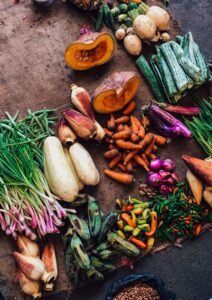“A farm includes the passion of the farmer’s heart, the interest of the farm’s customers, the biological activity in the soil, the pleasantness of the air about the farm – it’s everything touching, emanating from, and supplying that piece of landscape. A farm is virtually a living organism.”
-Joel Salatin
As economies around the world are becoming more globalized, so are our diets and lifestyles. Most of our kitchens have been transformed by the possibility of buying avocados from Peru or portobello mushrooms from Thailand. These exotic tastes and dishes have unlocked a whole world of opportunities. The other side of the same coin is the surge in farm-to-table businesses and ‘locally grown’ organic products. Amidst the confusion, an important question to ask is whether it matters where our food comes from? In short, the answer is yes.

Carbon footprint
Transportation of food products is a sizeable contributor to global carbon emissions. A supply chain has a few stages- farmers, suppliers, distributors, retailers, and then consumers. This supply chain can span across a state, a country, or even the world. Food products are often shipped large distances, across borders, and often via air. ‘Food miles’ refer to the greenhouse gas emissions associated with food production. Hence, the fewer miles our food travels, the less we contribute towards climate change.
Although ‘developed’ nations like the United States and European countries currently contribute much more to CO2 emissions driven by food transportation, urban Indian trends indicate that we may not be far behind in a few years. In the quest to keep our carbon footprint low, solar panels and electric cars cannot be our exclusive changes. A primarily plant-based diet incorporated with locally grown foods is the best solution to reducing our food miles and keeping our overall carbon footprint low.
(Eco-living tip: Use a free online carbon footprint calculator to learn more about personal contributing factors to greenhouse gas emissions and how we can tackle climate change from our homes!)

Support Farmers and economies
Local farmers are never too far away, especially in India, and they depend on our support to sustain their livelihoods. When we support these small farms, we support their practices and local communities as well. Our consumption choices can boost the local economy and create jobs within our communities for smaller farms and businesses. In this way, we can also protect critical eco-spaces and save all our land from becoming urban jungles.
Local farms are also more likely to be responsible for their environment and the soil health of their farm so that it lasts beyond a season and continues to deliver good quality products over the years. Unsustainable farming methods are a major cause of environmental degradation and carbon footprints, so buying organic, natural and local whenever possible is the best way to become more environmentally conscious!

Health and happiness
Historically, humans have evolved to eat local food that suits our climate and environment, for example, jackfruit and tender coconut during the hotter months of the year. In the past, we had no choice but to follow the seasons and eat various foods available at certain times of the year, this was until we were given access to foods grown in countries all around the world. Eating the same food throughout the year is monotonous and can also lead to nutrition deficiencies.
Additionally, local produce is often fresher, organic, and non-GMO. Studies have indicated that fresher foods tend to have a higher nutritional content compared to ‘older foods’. Regular supermarkets stock the same products throughout the year- when we make the switch to local farm produce, we can follow the natural cycle of seasons and enjoy a variety of foods. This will also ensure a full-rounded supply of nutrients throughout the year, and some delicious seasonal foods like jamun, mangoes, and lychees!
 Taste and Waste
Taste and Waste
There is enormous waste generated at almost every step in the supply chain, which directly impacts greenhouse gas emissions. More than 30% of food is wasted during primary food production stages and in every following stage of food processing, distribution, and transportation. There is wastage of food products that are considered unfit for sale due to physical appearance, spoiled goods during transport, and huge amounts of unsustainable packaging at every point. Scarce natural resources like water and land are also wasted due to this inefficiency, contributing to overflowing landfills and climate change. Locally grown food has a better taste due to its lower turnover time, it involves less packaging and transport with shorter supply chains, and it reduces waste at every level.
 Cost
Cost
The cost of food increases when it is transported long distances and costs get added at each stage of food processing and transportation. Spinach or cauliflower grown in Karnataka travels for 20-50 miles, whereas mushrooms from Vietnam travel 2100-2300 miles before it reaches our homes. This has a direct effect on our carbon footprints, and also the price of the food products we purchase. Similarly, a primarily vegetarian diet is cheaper and more sustainable at the food production level as it can reduce greenhouse gas emissions and unsustainable land use significantly. Hence, as we return to using local recipes and produce, our food can not only become healthier and tastier but also much cheaper.
References
https://www.carbonfootprint.com/calculator.aspx
https://www.cleanmetrics.com/pages/Ch9_0923.pdf
https://vegetableandbutcher.com/blogs/more-than-food/what-are-food-miles
https://www.ecowatch.com/10-reasons-why-you-should-eat-local-1882029859.html

 Taste and Waste
Taste and Waste Cost
Cost